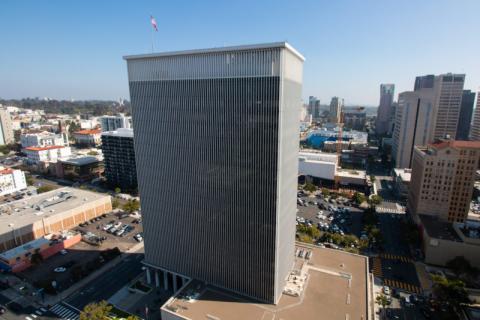[Part 1 in a series exploring all aspects of the 101 Ash St building deal]
By Arturo Castañares
Editor-at-Large
Internal emails from key city staff and officials in 2016 document their efforts to raise the value of a building by the City signing a 20-year lease-to-own agreement to help the sellers secure financing they couldn’t otherwise obtain, and, in an exclusive interview with La Prensa San Diego, the former City Attorney focuses attention back on current City Attorney Mara Elliott as the final backstop for the now-crumbling deal.
The lease deal has recently come under increased scrutiny and is being investigated by outside lawyers hired by Mayor Kevin Faulconer, and the current City Council is now focusing on ‘who knew what, when?’.
In a sign of the growing cloud over the deal, the City this week announced it will stop making the $545,000 monthly lease payment for the building that now sits vacant, signaling that the entire agreement may be undone.
The Back Story
The issue began with the City’s desire to find a new City office building to replace the outdated and crumbling offices within the City Operations Building (COB) in downtown.
For years, city officials had looked at options, including new construction at the current site or finding a suitable nearby building.
In 2014, city officials zeroed in on the 19-story Sempra Energy headquarters tower building built in 1967 that sits just across the street from City Hall, known by its address at 101 Ash Street.
Sempra had left the building when it moved to a new headquarters near Petco Park in the Gaslamp Quarter. The then-vacant Sempra building was owned 51% by Sandor Shapery, a long-time downtown building developer, and his 49% partner, Doug Manchester, the hotel developer and former owner of the San Diego Union-Tribune. They both have said publicly that Manchester bought his share in July 2015 for $20 million, imputing a value of the building of just over $40 million.

But Shapery and Manchester wanted $84 million for the building, and negotiations with the City broke down by late 2015.
The City then began conversations with Cisterra Development, a company that had brokered a lease-to-own deal in March 2015 for the City to buy Civic Center Plaza, an office building that sits within the City Hall complex at 3rd and B Streets and houses hundreds of City staffers, including the City Attorney’s office.
Cisterra agreed to serve as a middleman to buy and flip the 101 Ash building from Shapery and Manchester to the City for $72.5 million plus $5 million in tenant improvements; a price lower than the $84 million Shapery and Manchester had asked for earlier in the year.
City staff and officials worked to close the deal as a conventional purchase but they ran into a big hurdle; an internal draft appraisal valued the building at just $62.1 million.
Plan B
In a September 1, 2016 email from Deputy Chief Operating Officer Ron Villa to other key staffers, Villa informed them that, “based on the recent appraisal that came in for the building it is our belief that we will not be able to achieve approval for a purchase at the $72 million price.”

Villa’s email also suggested that he “would like to regroup and reexamine the potential for a straight lease with a future purchase option”, but warned his colleagues that “the fact remains that the general public and policymakers may not be able to get behind paying more for the building than the ‘appraised value.’”
Among those included on the email from Villa were Chief Operating Officer (COO) Scott Chadwick, Assistant COO Stacey LoMedico, Director of Real Estate Assets Cybele Thompson, and three lawyers within the City Attorney’s office. Thompson was a licensed real estate agent.
A week after Villa’s email, Cybele Thompson sent an email to key staff to thank them for helping drive the appraisal higher to try to reach the selling price, apparently in an effort to help Cisterra secure the financing they were attempting to close.
“You are all the best – thanks, Lisa [Celaya]!! As to David’s [Onate] question, the final appraised value was $67.1M – Jean was able to get the appraiser up from his original $62.1M :)”
Thompson included a smiley emoticon at the end of her email. Lisa Celaya was the City’s Assistant Director of Development Services, and David Onate was a City Accountant.
On Sept 7, 2016, Villa sent another email to staff explaining that “the City will no longer be pursuing a direct purchase and instead will be entering into a lease-to-own similar to [Civic Center Plaza]”, the other deal Cisterra had negotiated for the City.
City staff was suggesting a lease-to-own deal with Cisterra, who itself did not yet own the building. Cisterra was in escrow to purchase the building but had not secured its financing after the appraisal came in below the seller’s asking price.
The solution was for the City to agree to a long-term lease deal before the close of escrow to give Cisterra the projected revenue stream of the City rent payments and help to secure their financing. Cisterra would then securitize against the revenues to obtain its financing.
At $545,000 per month for 20 years, the City was committing to pay in excess of $128 million in rents, giving Cisterra enough projected revenues to secure the bond financing needed to buy the building without relying on the $67.1 million appraisal.
The Road Show
City staff now set off to convince Councilmembers.
Emails show a meeting between Cybele Thompson and City Councilman Todd Gloria on September 16, 2016, including other city staff and Gloria staffers. Gloria was a member of the Land Use Committee that had to approve the deal before it could go to the full Council.
No information is available as to what was discussed in that meeting, or what information was presented to Gloria. Gloria is now a State Assemblyman and candidate for Mayor, but two of the three other members of the committee at the time, David Alvarez and Committee Chair Lorie Zapf, now say they were not briefed about the deal before the Committee meeting. Gloria did not respond to a request last week by La Prensa San Diego for an interview.

On September 21, 2016, Villa and Thompson presented the lease deal at the City Council’s Land Use Committee [watch video] and explained to Councilmembers that downtown rents at the time were averaging $2.50 per sq. ft, but that future rates could increase to $2.80 to $4.00 per sq. ft., using those figures to justify the planned $1.70 per sq. ft. flat-rate lease-to-own deal.
The deal also required the City to cover an estimated $.79 per sq. ft. for maintenance, bringing the net costs to $2.49 per sq. ft.
But during the committee meeting, Thompson and Villa did not mention that the low appraisal valuation had caused the shift away from a purchase. The only thing the building needed, according to staff, was “a $10,000 power washing” before staffers could move in.
During the meeting, Gloria asked directly whether “a straight purchase” of the building had been considered, and Thompson responded that the purchase agreement between the owners and Cisterra “wasn’t clear that it would be able to be assigned to the City, so unfortunately, a direct purchase was deemed not the best option for the City.”
Again Thompson did not discuss the appraisal that valued the building below the purchase price.
Gloria also asked Thompson if additional savings could have been realized through a purchase, and Thompson responded that “using bond financing we estimated that we would save about $60 million over a 20 year period”, about $16 million more than under the proposed lease-to-own agreement.
“I think I understand the rest of it and I appreciate the time you spent with me in my office to understand this a bit better,” Gloria said, referring to their private briefing meeting the previous week.
“This seems to be a very smart financial transaction,” Gloria said during the meeting, “partnering with experts in the community and with folks that know how to get things done, everything about this sends a message to taxpayers that we kind of got our stuff together around here,” Gloria said. “I like a lot of what’s going on here and I just thank you very much.” Gloria then made the motion to approve the deal.
Republican Councilman Scott Sherman also thanked staff for their “excellent job in putting this deal together and getting it done” and “that we’re sending a good message to the taxpayers but I think we’re sending a good message to our employees as well.” Sherman did not raise any questions about the finances of the deal, but made the second to move the motion forward.

Councilman David Alvarez did raise some issues with the agreement, asking why the building was not purchased directly.
Again, Thompson repeated that Cisterra’s purchase agreement could not be assigned to the City, then Villa jumped in to say that “the language in that purchase and sale agreement is not clear enough to our bond counsel to be comfortable in making sure that that sale could go through or could be completed and then both parties would be liable.”
Alvarez was not convinced. He again asked why the City could not buy the building directly from the owners instead of through Cisterra and realize up to $16 million in additional savings for taxpayers. Thompson and Villa both pushed back but still did not reveal that the appraisal had not met the purchase price.
Thompson also added another reason to consider: She said that the City would avoid paying property taxes under the lease-to-own deal, but not under a purchase. Under California law, however, a building used by the City for governmental purposes does not pay property taxes, either if owned by the City or leased from a private owner. It isn’t clear whether Thompson, a licensed real estate agent, know the true nature of the property tax issue at the time, but no one disputed her assertion.
Another person in the committee meeting was Jason Hughes, a licensed commercial real estate broker has been serving as a non-paid Special Assistant for Real Estate Services for the City. Hughes is CEO and owner of Hughes-Marino, a local tenant representation company. Representatives from Cisterra were also present. Neither Hughes nor the Cisterra representatives spoke during the meeting or disputed the representations of the deal.
The staff recommendation presented by Villa and Thompson asked the Council to approve an expenditure of over $6 million in 2017 and up to $201 million over the following 20 years.
At the end of that committee meeting, all four members, including Chairwoman Lorie Zapf, Todd Gloria, Scott Sherman, and David Alvarez voted for the agreement to move forward to the full Council.
Council Approval
The lease-to-buy agreement went before the full Council on October 17, 2016. [Watch video]
Thompson presented the deal to the full Council and provided basically the same overview as she had in committee, except this time she added a slide that said Cisterra had offered the City several options, including an assignment of its purchase right, but that “subsequently Cisterra removed the purchase option which only left the lease-to-own option for the City.”
Thompson again left out the fact that the appraisal had valued the building lower than the purchase price.
During the Council meeting, the Independent Budget Analyst’s (IBA) office provided its review of the deal, and said that the deal represented an increase in the City’s overall rent expenses for the first four years, but that it could yield savings in future years.
The IBA presentation also highlighted that the City could have saved an additional $17 million through a direct purchase using Municipal Bonds, but that a review of Cisterra’s Purchase Sale Agreement did not allow for an assignment to the City without the consent of Shapery and Manchester. It is not clear if Shapery and Manchester were ever asked for their consent or if they refused to allow the City to purchase the building directly.
The IBA said that “the City Council may wish to ask additional information on this matter although since the release of our report we are aware that the City Attorney’s office has circulated a memo that did address some of these issues.” The City Attorney’s office has not released that memo to the public. The IBA presentation made no mention of the appraisal that valued the building below the sales price, although a printed report included a comment about the appraised value. [IBA Report 10/12/16]

Todd Gloria was the first Councilmember to speak, and started by “thanking Cybele, the team at Real Estate Assets, Mr. Villa, and other for bringing this option before the City Council.”
Gloria spoke positively of the building, twice saying that “for those of us that have been in it, it’s extremely well maintained” before concluding by making the motion to approve the deal.
“I see this as win all the way around…it’s a better business arrangement for the taxpayers…it’s something I want to be a part of today so I’m happy to make that motion,” Gloria said.
Jason Wood, one of the owners of Cisterra, spoke before the Council to explain why a direct purchase was not advisable.
“A purchase price change and time could possibly eliminate any perceived savings of a direct purchase by the City; in fact over the past few weeks, interest rates have risen and rates could further rise before the City could lock in interest rates and that would substantially decrease or even eliminate any benefit of a direct purchase,” Wood said. “Everything is lined up for this to become a reality, and any delay or attempt to renegotiate could seriously jeopardize that transaction and the savings the City would secure by doing that,” Woods warned.
Republican Councilman Scott Sherman spoke next to second the motion.
Council President Sherri Lightner said that the building “has been well maintained” and “is in very good condition”, but no one discussed that the purchase price was millions of dollar above the appraised value. Lightner added that she would “be supporting the action today.”
The Council voted unanimously for the deal, with Council President Sherri Lightner, and Councilmembers Todd Gloria, Lorie Zapf, Chris Cate, Mark Kersey, Scott Sherman, Myrtle Cole, David Alvarez, and Marti Emerald all voting to approve it.
After the City Council vote, the deal was sent to Mayor Kevin Faulconer for his signature, before being sent to the City Attorney’s office.
Final Approval?
The lease deal was finalized by the City Attorney’s office on December 19, 2016, just one week after Mara Elliott was sworn in as the new City Attorney.

A spokesperson for Elliott issued a statement this week that “As you know, Mara Elliott was not in office when this deal was approved, and she did not work on it as a Chief Deputy City Attorney before being elected”, giving the impression that Elliott had no role in the deal.
But her predecessor says Elliott had full access to all files and personnel within the City Attorney’s office for the month between her election and her swearing in – a full six weeks before the lease deal was signed – and that the City Attorney is the final approval, not the Council.
Former City Attorney Jan Goldsmith told La Prensa San Diego this week in an exclusive interview that, after the election, Elliott was treated like the City Attorney-elect and given complete access to all of the inner-workings of the office.
“Immediately upon Mara Elliott’s election victory in November, 2016, she was given full access to all matters in the office and all office personnel,” Goldsmith told La Prensa San Diego. “She used her office for transition,” Goldsmith said.

Goldsmith also said that an agreement like the 101 Ash Street lease-to-own deal does not become legal until the City Attorney signs it, and the City Attorney is not obligated to go along with the deal even after the City Council passed it.
“She didn’t have to sign it,” Goldsmith said of City Attorney Mara Elliott. “A contract is not enforceable absent sign-off by the City Attorney. That is set forth in the city charter and state law. Even after the City Council approves an agreement, the City Attorney has the authority to refuse to sign off. The City Council could then reconsider in light of issues raised or drop it. Again, there is no enforceable contract without City Attorney sign-off,” Goldsmith added.

The actual signed agreement shows that Jan Goldsmith’s printed name was scratched out and Mara Elliott’s name was written in before the final signature was added to the deal. [see document]
Goldsmith was injured in a fall in September 2016 and was out of the office with a head injury through the rest of his term. He said he was not involved in the negotiations or approval of the lease-to-own deal.
Previously a Superior Court Judge, State Assemblyman, and Mayor of Poway, Goldsmith was a real estate lawyer earlier in his career. He served as San Diego City Attorney for two terms from 2008 to 2016, and was replaced by Elliott on December 9, 2016.
…to be continued…
The Morning After
Remodeling Costs Skyrocket
Wait, There’s More
Investigations
Stop the Payments!
Who Made Money?
Autopsy
